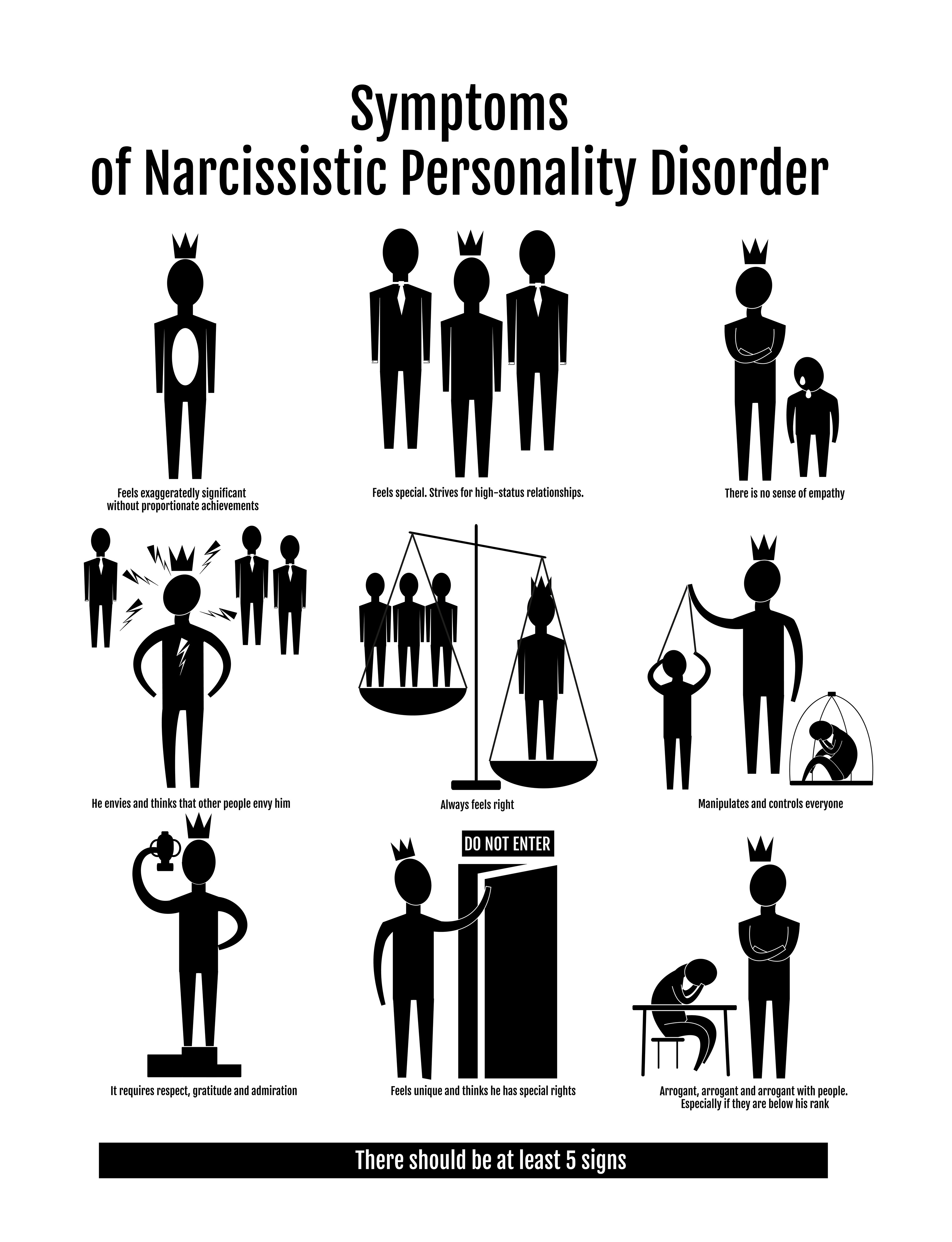Dealing with a narcissist can be challenging and exhausting, especially when it comes to gaining their respect. Narcissists are known for their grandiose sense of self-importance, their need for admiration, and their lack of empathy towards others. As a result, forming a healthy relationship with a narcissist can seem almost impossible. However, some strategies can help you navigate this tricky terrain and ultimately, establish a sense of respect in your interactions with them.
To command respect from a narcissist, it is crucial to understand their way of thinking and behavior. Confidence and assertiveness are two key elements that can help you stand your ground, even in the face of their manipulations. Moreover, it’s essential to manage conflicts, competition, and navigate social interactions in a way that demonstrates your strength and self-assurance. Being aware of potential barriers and addressing them effectively can make it easier to coexist and collaborate with a narcissist.
Key Takeaways
- Understand narcissists’ behaviors and thought patterns to command respect
- Be confident and assertive in dealing with manipulation and managing conflicts
- Address potential barriers in interactions to navigate relationships with narcissists effectively

Understanding Narcissism
Narcissism is a trait characterized by excessive self-centeredness and inflated self-evaluation. Understanding the various aspects of narcissism is essential to make a narcissist respect you. This section will break down some key aspects, including Narcissistic Personality Disorder, Malignant Narcissist, and The False Self.
Narcissistic Personality Disorder
Narcissistic Personality Disorder (NPD) is a mental health condition affecting an individual’s thinking, feeling, and behavior. People with NPD often have a grandiose sense of self-importance, lack empathy for others, and demand admiration. They usually struggle with maintaining healthy relationships due to their self-serving demeanor. To understand how to gain their respect, it is crucial to recognize these behaviors and learn how to manage interactions with them effectively.
Malignant Narcissist
Malignant narcissists take narcissism to a more extreme and toxic level. They exhibit strong traits of antisocial behavior, aggression, and disregard for others’ feelings. Malignant narcissists may also have a history of manipulating or exploiting people for their benefit. It is essential to approach these individuals cautiously, as they can be unpredictable and potentially cause harm. Gaining respect from a malignant narcissist may require setting firm boundaries and maintaining a strong sense of self.
The False Self
The false self refers to the facade that narcissists create to present themselves to the world. This persona often consists of exaggerated achievements and qualities to appear superior. The false self helps them receive admiration, attention, and validation, which they deeply crave. Recognizing and understanding their false self may help them navigate conversations and avoid unnecessary conflicts when interacting with a narcissist. Gaining their respect involves acknowledging their accomplishments without feeding into their inflated ego.

Gaining Respect in Relationships
Establishing Boundaries
Establishing clear boundaries in any relationship is essential, especially when dealing with a narcissist. Setting boundaries is not only about defining what is acceptable but also about asserting one’s self-worth. Healthy boundaries can include personal space, time, and emotional limits. By communicating these limits, the victim prevents the narcissist from manipulating or controlling them, forcing the narcissist to respect their wishes.
Consequences and Accountability
To reinforce boundaries, it is crucial to implement consequences when they are not respected. This may involve distancing oneself from the narcissist or ending the relationship completely. Holding the narcissist accountable for their actions and maintaining a consistent stance in enforcing consequences is vital. This practice sends a clear message that disrespect will not be tolerated and fosters an environment where they must acknowledge and respect the boundaries set.
Self-Worth and Confidence
Self-worth and confidence play critical roles in demanding respect from a narcissist. Individuals must understand their value, recognize that they deserve respect, and be willing to assert themselves when necessary. Maintaining an independent, confident demeanor can help limit a narcissist’s emotional manipulation, leading to a healthier relationship dynamic. Additionally, cultivating a network of supportive family members or partners can provide emotional strength, further empowering individuals to demand the respect they deserve.

Dealing with Manipulation
Identifying Gaslighting
Gaslighting is a subtle form of manipulation where the manipulator tries to make the target doubt their feelings, memories, or perceptions. To identify gaslighting, watch for these signs:
- The narcissist denies a previous promise or something they said
- They accuse the target of being overly sensitive or emotional
- They try to question the target’s memory of events
Recognizing gaslighting helps the target avoid falling into the manipulator’s trap.
Rejecting Manipulative Tactics
To reject manipulative tactics, one should:
- Trust their instincts and memories
- Keep a record of conversations and events
- Seek support from friends and professionals
- Set and enforce clear personal boundaries
- Practice assertive communication
By doing so, the target empowers themselves against the narcissist’s manipulation.
Standing Up to Criticism
Facing criticism from a narcissist can be tough, but standing up to it can make a difference. Here’s how:
- Stay calm and collected
- Respond, rather than react, to their remarks
- Acknowledge valid points, but reject exaggerated or false claims
- Refuse to fall into a defensive or argumentative stance
- Know when to disengage from unproductive conversations
Developing the ability to stand up to criticism can make it harder for a narcissist to manipulate.

Asserting Authority
Displaying Confidence
An individual must display self-confidence when interacting with a narcissist. By maintaining a strong sense of self and remaining emotionally independent, one can exhibit confidence and limit the need for external approval. This can be achieved through clear communication, strong body language, and asserting personal boundaries.
Commanding Respect
Individuals should approach situations with assertiveness and clear boundaries to command respect from a narcissist. Emphasizing their achievements and successes can also aid in establishing authority. Avoiding the temptation to react emotionally to disrespectful comments or behaviors will convey strength and encourage the narcissist to treat the individual with respect.
Managing Social Hierarchy
A key aspect of establishing authority with a narcissist involves managing the social hierarchy. Individuals should position themselves as a powerful and successful figure, commanding the attention and admiration of those around them. This can be achieved by:
- Networking and building relationships with influential people
- Demonstrating one’s expertise and knowledge in relevant fields
- Refraining from feeding the narcissist’s ego or competing with them for attention
Individuals can assert authority with a narcissist and maintain respectful interactions by focusing on their self-assuredness, commanding respect, and managing social hierarchies.
Managing Conflict and Competition
Healthy Competition
Encouraging healthy competition can be beneficial to the individuals involved. Focusing on personal growth and accomplishments can create an environment where a narcissist’s need for superiority is less threatening. Emphasize the importance of setting clear goals and working towards self-improvement rather than comparing oneself to others.
Handling Narcissistic Envy
Narcissists tend to become envious when they perceive someone as threatening their self-worth or social status. Recognizing the signs of narcissistic envy, which may include contempt, passive-aggressive behavior, and attempts at sabotage, is essential. If such behaviors arise, it’s crucial to confront them composedly without escalating the conflict or playing into the narcissist’s desired outcome.
Maintaining Dignity and Grace
When a narcissist attempts to bring others down, it’s important to maintain dignity and grace. One can demonstrate self-worth and resilience by refusing to stoop to their level or engage in trivial power struggles. Staying calm, assertive, and composed during conflicts helps convey a strong, unflappable character that can stand up to a narcissist’s manipulative tactics.
Navigating Social Interactions
Building a Support Network
Establishing a strong support network when dealing with a narcissist is crucial. Surrounding oneself with reliable, compassionate individuals who can offer valuable opinions and encouragement helps maintain a sense of self-worth when confronted by the narcissist’s charm and entitlement. These connections can also provide the necessary skills and resources to counteract the narcissist’s attempts to undermine your social status and appearance.
Neutralizing Attention-Seeking Behavior
Narcissists thrive on attention and admiration from their followers, also known as their narcissistic supply. To neutralize this behavior, one can employ strategies such as setting boundaries, refusing to engage in power struggles, and redirecting conversations to more constructive topics. Not feeding the narcissist’s need for validation weakens their influence and makes it easier to assert oneself in their presence.
Using Empathy and Compassion to Influence
Although narcissists may appear to lack empathy and compassion, demonstrating these qualities toward them can profoundly affect their behavior. Showing genuine concern for their feelings and needs can make them more receptive to your opinions and desires, thus promoting a healthier and more balanced dynamic. By doing this, one can subtly guide the narcissist towards a greater understanding and appreciation of others’ perspectives, ultimately fostering respect and cooperation in social settings.
Acknowledging and Addressing Potential Barriers
Accepting Limitations
The first step in making a narcissist respect someone is to accept their limitations and recognize that they cannot change the narcissist’s core personality traits. Individuals must focus on their accomplishments and not seek constant praise or validation from the narcissist. When dealing with a narcissist, whether a co-worker or a neighbor, setting boundaries and maintaining one’s dignity is crucial.
Seeking Professional Help
If interactions with a narcissist consistently lead to feelings of devaluation or aggression, seeking therapy or professional help can be beneficial. A therapist can provide guidance on how to handle difficult situations, identify patterns of abusive behavior, and help build resilience against rejection. Therapy can also be an empowering experience, helping individuals to gain self-esteem and confidence in their ability to manage a narcissist.
Protecting Oneself from Abuse
In certain circumstances, narcissists may become abusive, both emotionally and physically. To protect oneself from this abuse, setting clear boundaries and ensuring that these are communicated and upheld is crucial. This may include setting limits on the amount of time spent with the narcissist, specifying acceptable topics of conversation, or creating physical distance when necessary.
When protecting oneself from abuse, consider the following strategies:
- Establish boundaries: Communicate what behaviors are unacceptable and state the consequences if those boundaries are breached.
- Document incidents: Record any abusive incidents, including dates, times, and details, as this may be important if legal action is taken in the future.
- Reach out for support: Connect with friends, family, or support groups who can offer emotional encouragement and practical advice.
- Seek help: If the situation escalates, contact local authorities or abuse hotlines to report the behavior and seek assistance.
Additional Tips for Interacting with a Narcissist
When interacting with a narcissist, it is important to remember the following tips:
Stay composed: Demonstrate self-worth by staying calm and composed during difficult interactions.
Focus on yourself: Avoid engaging in power struggles and focus on your growth and accomplishments.
Set boundaries: Communicate boundaries and expectations, and enforce them when necessary.
Be empathetic: Showing genuine concern for the narcissist may encourage more cooperative behavior.
Seek help: If needed, contact family, friends, or professional support services for advice and assistance.
Taking these steps can help individuals learn how to make a narcissist respect them while maintaining their dignity and well-being. With patience and understanding, individuals can learn to navigate their interactions with a narcissist more effectively while protecting themselves from potential abuse. Ultimately, the most important thing is for individuals to remember that they are worthy of respect and should never let anyone make them feel otherwise. By taking charge of their own life and setting clear boundaries, individuals can create a safe space where genuine connection and mutual respect can be cultivated.
Frequently Asked Questions
How to gain a narcissist’s attention?
Individuals should display an air of confidence to gain a narcissist’s attention. Approaching them with a genuine interest in their thoughts and ideas can also be effective, but it is important to maintain boundaries. Offering compliments and admiration for their achievements can draw their attention and engagement.
Ways to earn a narcissist’s value?
Earning a narcissist’s value requires showcasing one’s skills, intelligence, and accomplishments. Demonstrating self-assuredness, supporting their goals, and winning their trust can also be beneficial. Remember to be patient and consistent, as narcissists may not recognize value immediately.
How to influence a narcissist’s behavior?
Influencing a narcissist’s behavior can be achieved through positive reinforcement. Acknowledging their good deeds, emotional intelligence, and empathy can encourage them to adopt similar behaviors. Providing logical arguments that align with their self-interest can also motivate them to change.
Methods for making narcissist kind?
Promoting kindness in a narcissist entails setting healthy boundaries and being a positive role model. Focus on fostering empathy by encouraging them to put themselves in others’ shoes. Expressing appreciation when they show kindness and compassion can reinforce these actions, leading them to become habits over time.
How to make the narcissist feel regret?
Making a narcissist feel regret can be difficult due to their natural defensiveness. However, one approach can be fostering self-awareness and having non-confrontational conversations about their behaviors and their consequences on others. Providing space for introspection can lead to a greater understanding of their actions and, in some cases, feelings of remorse.
Strategies to make narcissists want you back?
If seeking to rekindle a relationship with a narcissist, displaying independence, strength, and confidence is key. Demonstrating personal growth and improvement can make them more receptive to rebuilding a connection. Open communication about the changes and mutual understanding of boundaries can also contribute to rebuilding the relationship.
- Stress Relieving Benefits of Spending Time in a Garden: Interesting Facts to Know - February 16, 2024
- How to Reduce Anxiety Immediately: Quick and Effective Techniques - February 15, 2024
- Can Stress Cause Bloating? Understanding The Link Between Stress And Digestive Issues - February 15, 2024
This site contains affiliate links to products. We will receive a commission for purchases made through these links.




